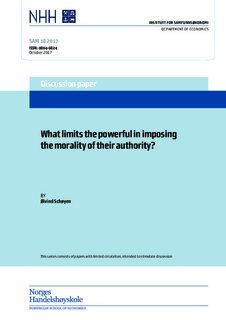| dc.contributor.author | Schøyen, Øivind | |
| dc.date.accessioned | 2017-10-09T11:24:00Z | |
| dc.date.available | 2017-10-09T11:24:00Z | |
| dc.date.issued | 2017-10 | |
| dc.identifier.issn | 0804-6824 | |
| dc.identifier.uri | http://hdl.handle.net/11250/2459176 | |
| dc.description.abstract | This paper models a game between an authority, seeking to implement its preferred morality, and a parental generation, seeking to socialize a younger generation into the their own morality. The authority chooses a coercion level for adhering to the non-state morality, whereupon the parental generation chooses whether to insurrect and, if not, how much to invest in socialization. The novel feature of this paper is that we formalize and explore the consequences of an intrinsic negative reaction to coercion: coercion resentment. The key result is to show the necessary micro-level assumptions for an ineffcient interval of coercion that can account for authorities choosing to restrain their use of coercion. Furthermore, the paper characterizes the socialization and insurrection preferences needed for the long run equilibrium to be path dependent. Two historical periods are presented through the lens of the model: the Counter-Reformation in early modern France and the Holy Roman Empire (1517-1685) and the Soviet Secularization project (1922-1991). | nb_NO |
| dc.language.iso | eng | nb_NO |
| dc.publisher | Institutt for samfunnsøkonomi, NHH | nb_NO |
| dc.relation.ispartofseries | DP SAM;18/2017 | |
| dc.subject | Moral persistence, Political legitimacy | nb_NO |
| dc.title | What limits the powerful in imposing the morality of their authority? | nb_NO |
| dc.type | Working paper | nb_NO |
| dc.subject.nsi | VDP::Samfunnsvitenskap: 200 | nb_NO |
| dc.source.pagenumber | 99 | nb_NO |
